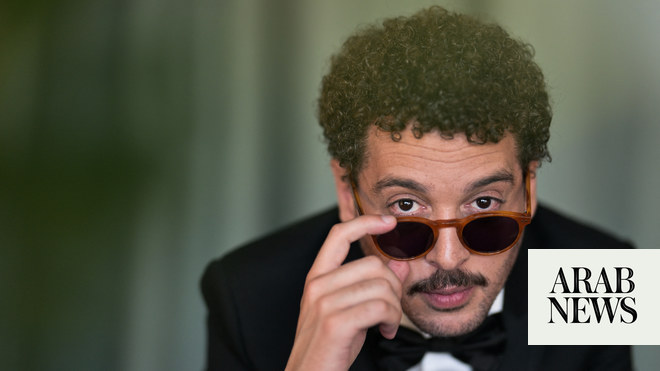
The first Arabic-language Netflix original movie has been a huge success both regionally and internationally thanks to stellar performances from the cast and its first-time director
DUBAI: It’s been a long time since an Arabic-language film has dominated conversation across the Arab world quite like “Perfect Strangers” currently is. The first original Arabic-language Netflix film — an adaptation of the award-winning Italian original of the same name — has been trending across the region since its launch on January 20, inspiring both overwhelming praise for its stellar performances and fierce debate over the questions it poses.
“Perfect Strangers” was helmed by Lebanese director Wissam Smayra and features several of the region’s most-acclaimed actors, including Egypt’s Mona Zaki and Eyad Nassar alongside Lebanon’s Georges Khabbaz, Diamand Bou Abboud, Nadine Labaki, Adel Karam, and Fouad Yammine.
Set during a dinner party held by a group of Egyptian and Lebanese friends, the film revolves around a game in which each person puts their mobile phone on the table, exposing to the rest every call or message that they receive. What starts off as light fun quickly descends into dramatic chaos as painful truths come to light.
The film has already stirred controversy on social media with some Twitter users accusing the movie of “moral degradation” and “putting Western ideas in a conservative society.”
Much of the anger has originated in Egypt, according to the Hollywood Reporter, with one example being Egyptian lawyer Ayman Mahfouz who claimed that the movie is a “plot to disrupt Arab society.”
“The film touches on taboos, but it’s not about the taboos,” Zaki, the biggest star in Egyptian cinema, tells Arab News. “The main idea is about the privacy we hide in our phones, how we keep secrets from everyone around us, and how — for so many of us — even those who we are closest to know nothing about us.”
Bou Abboud defines the point of the film further: “It’s about exploring the exact limit to which we can reveal ourselves to the closest people around us and not be judged.”
“We tackle each topic without (judgment),” adds Smayra. “We’re not trying to prove anything. We are just going into reality and focusing on the human interactions it inspires.”
The film is a landmark in more ways than one, an eminently accessible mainstream drama that has immediately found a global audience, trending at the top of Netflix in countries including France and proving that Arab film is reaching a turning point both in terms of quality and widespread popularity, regionally and internationally.
“Respect (for Arab film) is starting to really grow. And this is a milestone, I think,” says Labaki, the Oscar-nominated director of “Capernaum.”
To achieve the naturalistic style of “Perfect Strangers,” Smayra approached the film much like a piece of theater, rehearsing the script from start to finish with his actors for weeks on end, and filming the entire project chronologically rather than out of order, as is the norm for most films.
During filming, Smayra and the cast would meet every day out of costume and without make up, running through that day’s 10-minute scene 20 to 30 times in a row for hours until it became second nature, before filming the scene that night.
“This is when you know that you have amazing actors,” says Smayra. “It wasn’t normal — these were crazy, insane geniuses. I was witnessing something magic.
“We worked with two cameras. Each day, we would start shooting for three or four hours until it was done,” he continues. “It was insane. Afterwards I could see they were all drained.”
“And that was even though we were all just sitting around a table!” says Zaki. “It was an emotional drain.”
“It was easy for me, though,” adds co-star Karam, who also starred in the Oscar-nominated film “The Insult,” with a smile.
Part of the reason for most of the cast’s constant exhaustion was that, unlike most films, there were no breaks for the actors. Because of the multiple handheld cameras and the nature of the story, the troupe could never drop out of character.
“The way it was shot was very important. You had to be present the whole time — even if it"s not your moment, even if you know you"re not going to be talking for a while,” says Labaki. “We were present not only as characters but as ourselves, watching the performance of somebody else that is so real that you really feel you"re in it, you really identify, and you start thinking about your own situation. It was really fascinating.”
Smayra, who, like Labaki, got his start directing music videos in Lebanon in the early 2000s, has worked with Labaki in the past, executive producing “Capernaum.” Though it was his first feature-length film, he was a soft-spoken but assured presence, and never leaned on his fellow director in the cast as others have.
“I never felt I was working with a first-time director,” says Labaki. “I felt from the start that this was going to be great; I was in good hands. Because of that, my only concern became doing the best I can for the character, and for everybody else, because you feel like everybody"s performing on such a high level. I felt like I needed to be up to the expectations, and up to the standard they were all setting. I really loved this whole adventure.”
For Egyptian star Nassar, what was truly remarkable is how nothing was lost in translation, and all the power he felt in the moment remains on the screen in the final cut.
“I told Wissam, ‘You are a magician.’ As an actor, I knew the subtleties I had introduced while filming and I knew the best moments of the other actors,” he says. “Watching it, there are no missing moments. All the actors’ power was there, nothing lost in the editing. He was seeing everything. I’ve never seen that done so well.”
And Nassar says that, to his surprise, he left the set a changed performer. “After I finished ‘Perfect Strangers’ and got back to Egypt, I had a different style of acting,” he says. “Working with actors such as Georges Khabbaz allowed me to see other schools of acting.”
Khabbaz, Lebanon’s most renowned stage actor, found the film uniquely challenging, though he ends up being the film’s quiet and soulful anchor and has received an outpouring of praise online for his performance.
“I am a man of the stage,” Khabbaz explains. “The stage has vast space, which allows you to express using all tools. This role was different. It was difficult. To do it, I had to keep my emotions closer to my chest, and show them only in reactions. I tried to do this role as an Eastern man but maintaining the Western concept of the movie. For this performance, I became a man of reaction, not a man of action.”
While some of the discussion around the film has focused on why Arab cinema is producing remakes rather than crafting original stories, each cast member made sure that “Perfect Strangers” responded to that concern with gusto, crafting a true piece of art that stands as the best version of the concept — one possessed with a uniquely Arab spirit — rather than a lazy cash-in.
“Throughout the filming, my inner question was: ‘Why are we making this movie?’ We constantly discussed how we could present this material as Eastern people for an Eastern audience,” says Nassar. “The answer lay in how the dilemma the film poses affects Eastern people uniquely. We ended up discovering during the whole filming process why we were doing the Arabic version of this movie. In the end, it was very clear to all of us, and it will be to audiences, as well.”











